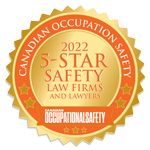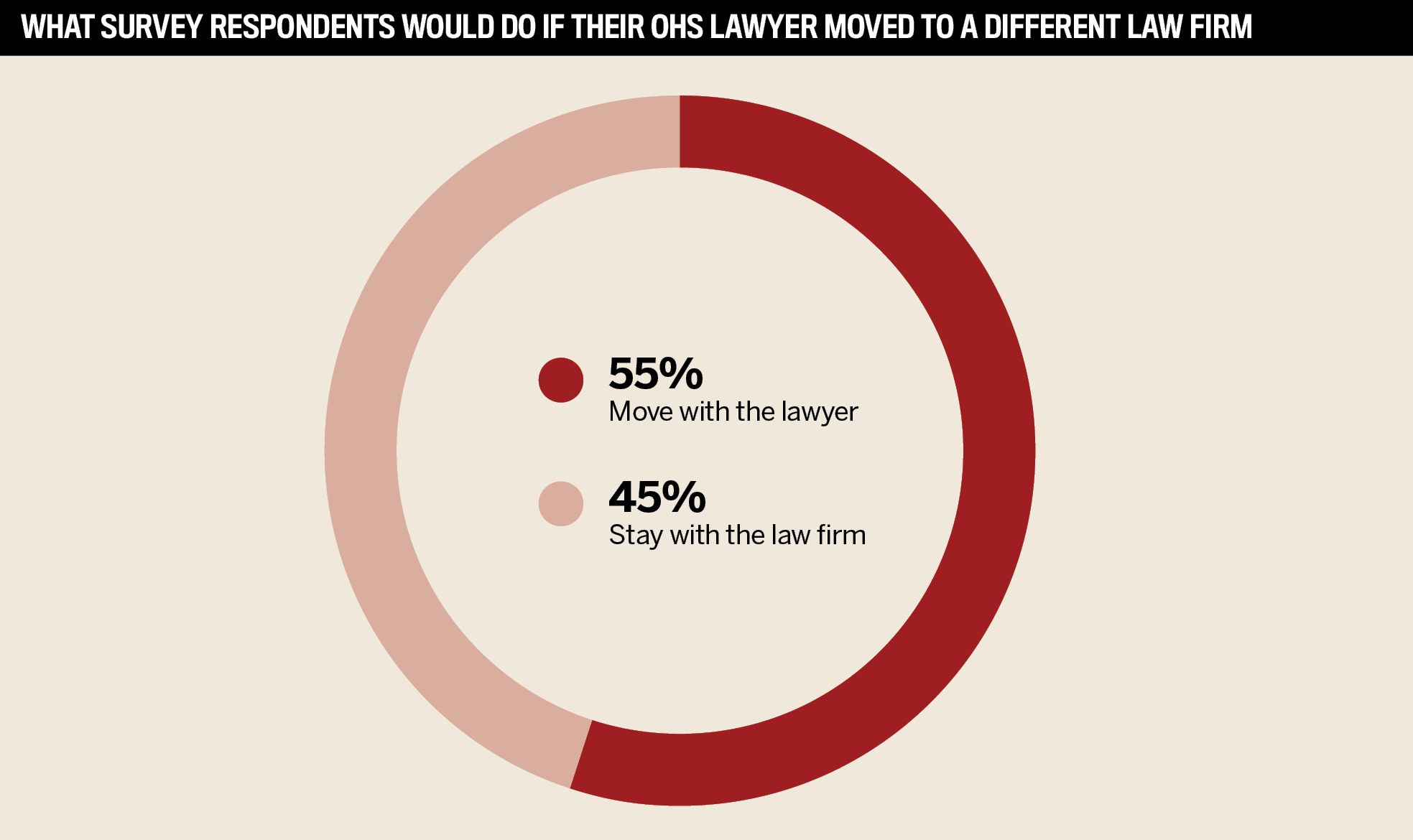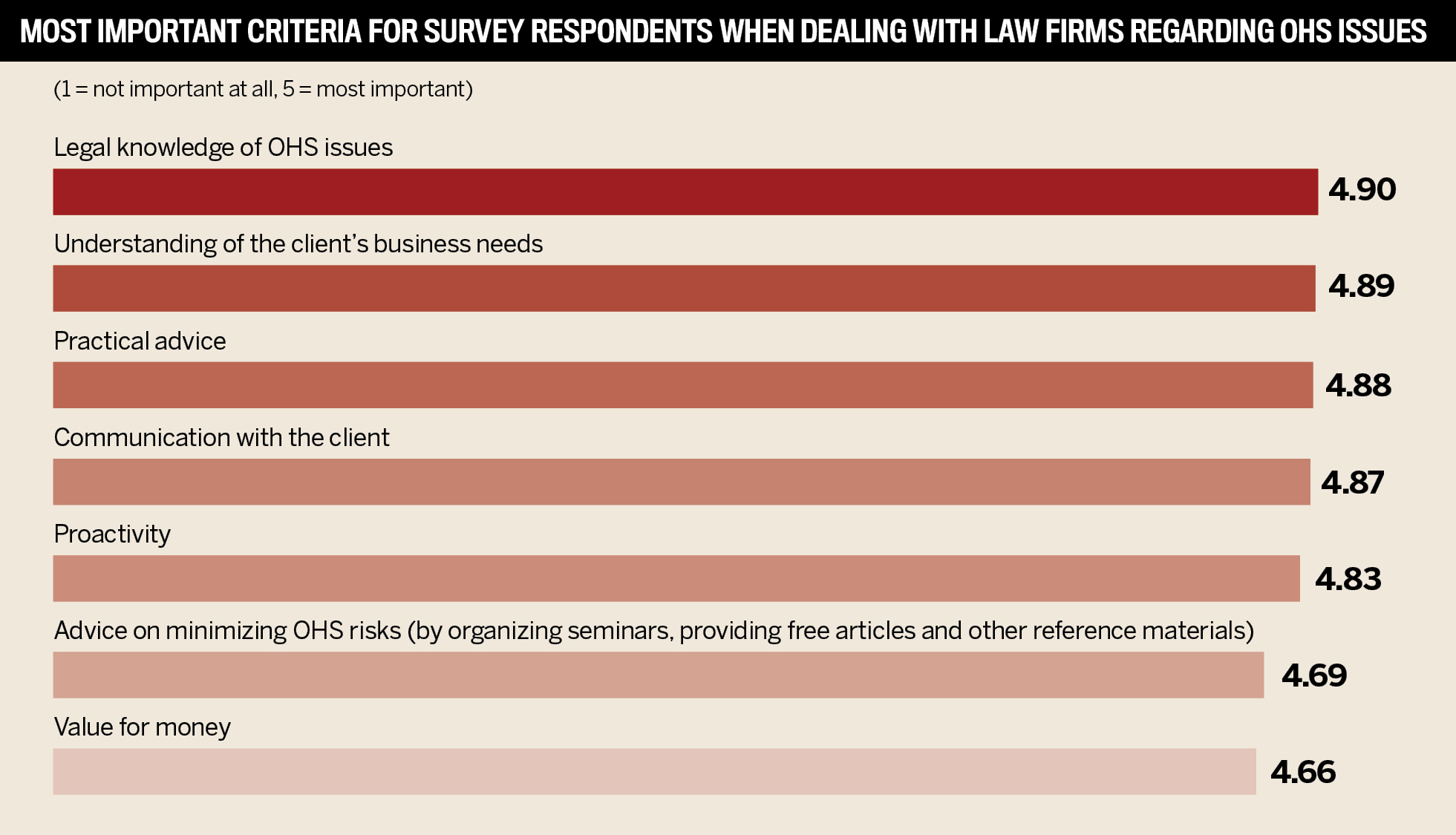

Jump to winners | Jump to methodology
The occupational health and safety sector is fast evolving in Canada as multiple provinces ponder or propose new legislation that is expected to have a significant impact on OHS professionals across the country and employers in various industries. This is why it’s important to have access to good legal counsel who can help clients navigate ever-changing rules and regulations.
Canadian Occupational Safety is proud to recognize the lawyers and law firms that are leading the way and demonstrating admirable depth of knowledge on workplace safety matters. The COS team hopes that this special report, which presents the winners from different provinces, will be a helpful resource for employers and safety professionals who need to be compliant with legal requirements.
With new changes being introduced in many provinces, 2022 has already proven to be a huge year for OHS legislation. The pandemic has propelled the sector forward in a number of areas, and this is particularly evident when it comes to rules and regulations. COS provides a summary of the major changes so far, and some key issues to keep in mind.
“Employers must ensure that workplace safety measures are carried out by not permitting workers the discretion to decide when they will protect themselves and other workers”
Jeremy Warning, Mathews Dinsdale & Clark LLP
Most recently in Ontario, Scotlynn Farms became the first employer to be prosecuted for a COVID-19 related death under the province’s health and safety laws. Among other charges, the company pled guilty to the death of one of its workers. The farm was ordered to pay a fine of $125,000 and an additional $31,250 for court costs. This case is significant because the fine ranks as one of the highest penalties imposed for a breach of the Occupational Health and Safety Act (OHSA) that is not connected to an injury,” says Jeremy Warning, a partner at Mathews Dinsdale & Clark LLP, one of the winning law firms.
“The case is also a reminder that employers must ensure that workplace safety measures are carried out by not permitting workers the discretion to decide when they will protect themselves and other workers,” he says.
“Proponents of creative sentencing say it’s not enough to use fines as the principal means of punishment, especially for organizations with deep pockets where the impact of a fine is simply a cost of doing business”
Cathy Chandler, Fasken
Also in Ontario in 2022, the provincial government passed the new Working for Workers Act, which contains amendments to the province’s OHSA. The Act raises maximum fines for individuals quite significantly. For example, officers and directors will be subject to a maximum fine of $1,500,000 – 15 times the previous maximum penalty. The Act also provides for the Court to make additional orders on sentencing pursuant to an anticipated Regulation.
“What might be prescribed is unknown at this time, but there are several possibilities, such as probation, retraining, or donations to industry-related safety organizations,” says John Illingworth, another partner at Mathews Dinsdale & Clark.
In addition, the Act imposes new requirements on employers to provide naloxone kits and related training to address the risk of a worker having an opioid overdose at work.
In 2021, New Brunswick also introduced new administrative penalties that can be issued by WorkSafeNB health and safety officers as an alternative to prosecution.

Creative sentencing has been around in Alberta since the 1990s. This type of sentencing offers a range of penalty options such as the possibility of diverting funds stemming from penalties to projects which have a connection to the offence. Cathy Chandler of Fasken, another winning law firm, says that it links punitive measures to improved health and safety outcomes as an alternative to financial penalties or even imprisonment.
“Proponents of creative sentencing say it’s not enough to use fines as the principal means of punishment, especially for organizations with deep pockets where the impact of a fine is simply a cost of doing business,” writes Chandler in a column for COS.
“Although there appears to be growing recognition that public interest can be better served with a creative sentence, it remains to be seen what the legislative reaction will be in provinces that don’t have provisions for creative sentencing,” she says.
These types of penalties are also slowly making their way to other provinces, and it will be interesting to see how they take shape in the context of increased penalties in certain provinces.

Ontario recently introduced right-to-disconnect legislation for companies with 25 or more employees. The rules came into effect on June 2, 2022. Other provinces such as British Columbia are also mulling over similar legislation which could help workers have a better work-life balance. There are implications for worker safety, with the legislation potentially helping mitigate fatigue and exhaustion by creating stricter boundaries around work hours. Conversely, it may be the case that in certain emergency situations, employers need to reach their workers outside of their set work hours. Proper legal advice is essential to help employers navigate new laws to ensure workplace safety.
This year marked the 30th anniversary of the Westray Mine disaster, which led to the amendment of the Canadian Criminal Code in 2004 through the introduction of Bill C-45, more commonly known as the Westray Bill. Despite this legislation, very few companies have actually been prosecuted under the Criminal Code. Legal experts have questioned its usefulness, considering that OHS is legislated at the provincial level while the Criminal Code operates at the federal level.
In addition, it may be easier to yield results under provincial OHS legislation because the burden of proof is lesser. The prosecution may find it easier to charge under OHS laws because in situations where a criminal charge is viable, prosecutors have to prove that there was willfully gross negligence.
A minefield that employers had to navigate for the past couple of years, pandemic-related requirements and mask mandates are now becoming more relaxed in many provinces. While these measures are easier to remove than to put in place, it remains to be seen how long they will be relaxed as COVID-19 is still a reality around the world. And the truth of the matter is that reliable legal counsel has been essential in helping employers around Canada navigate these frequently changing rules.
OHS doesn’t exist within a vacuum – workplace conditions change as a reflection of social reality. With the social and political landscape in Canada changing at such a fast pace, it stands to reason that workplaces are also evolving. We have seen a massive amount of upheaval over the last few years because of the pandemic, civil rights movements, the opioid crisis and climate change. Through all this, what is constant is how the right lawyers can make a great difference in assisting organizations and professionals as they adapt to changing times.
To determine the best lawyers and law firms catering to the OHS sector, Canadian Occupational Safety sourced feedback from safety leaders over a 15-week period. The COS research team began by conducting a survey of a wide range of safety companies to determine what they value in the law firms they collaborate with. The in-depth information gleaned from this survey enabled the research team to assign weighted values to the services offered by the law firms to their safety clients.
The research team also spoke to hundreds of safety professionals across the country by phone, asking them to rate the safety law firms and lawyers they had worked with over the previous 12 months. In addition, the team sought the opinions of safety lawyers themselves to find out which law firms they would recommend besides their own. At the end of the research period, the law firms and lawyers that received the highest rankings in terms of work quality, specialist expertise, and client service were declared 5-Star Award winners in the field of safety law.
62% of survey respondents are from Ontario
14 law firms won 5-Star Awards in 2022
6 of the winning law firms also won in 2021